#Al Baghdadi
Explore tagged Tumblr posts
Text
The tip of love’s sword glanced the vein of the spirit—
When one drop emerged, its name was the heart.
— MAJD AL-DIN BAGHDADI ⚜️ Love’s Alchemy: Poems from the Sufi Tradition, transl. by David Fideler & Sabrineh Fideler, (2010)
#Persian#مجد الدين البغدادي#Majd al-Din Baghdadi#Love’s Alchemy: Poems from the Sufi Tradition#David Fideler#Sabrineh Fideler#(2010)
15 notes
·
View notes
Text
it's going to be genuinely interesting to watch people committed to hating trump/republicans bend over backwards to try to pretend every good thing that happens (including things they themselves want to happen) is attributable to something other than trump, his cabinet, his administration, or the republican majority in congress. that, or try to spin it into a bad thing.
8 notes
·
View notes
Text
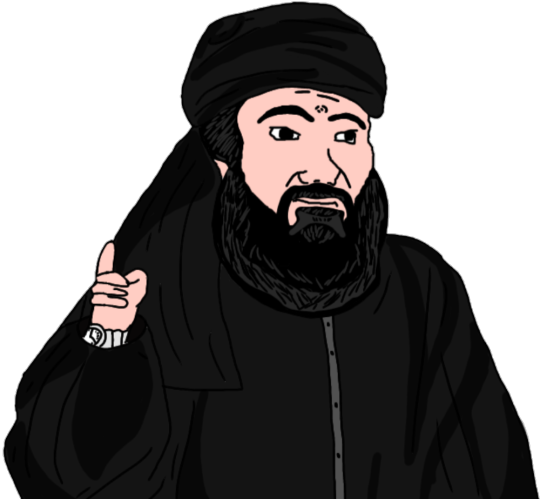
Title/Name: Ibrahim Awad Ibrahim Ali al-Badri, commonly known as 'Abu Bakr al-Baghdadi', (1971-2019). Bio: Iraqi militant, caliph of the Islamic State. Country: Iraq Wojak Series: Feels Guy (Variant) Image by: Unknown Main Tag: Abu Bakr al-Baghdadi Wojak
#Ibrahim Awad Ibrahim Ali al-Badri#Abu Bakr al-Baghdadi#Iraqi militant#Islamic State#Iraq#Feels Guy#Variant#Wojak#Politics#Islam#Muslim#Religion#Feels Guy Wojak#Abu Bakr al-Baghdadi Wojak#Feels Guy Series#Gray#Black
3 notes
·
View notes
Text
RUSSIA’S SUPREME COURT OUTLAWS LGBTQ
Russian security forces raided gay clubs and bars across Moscow Friday night, less than 48 hours after the country’s top court banned what it called the “global LGBTQ+ movement” as an extremist organization. (Photo by Anton Vaganov/REUTERS) TALLINN, Estonia (AP) — Russia’s Supreme Court effectively outlawed LGBTQ+ activism on Thursday, the most drastic step against advocates of gay, lesbian and…
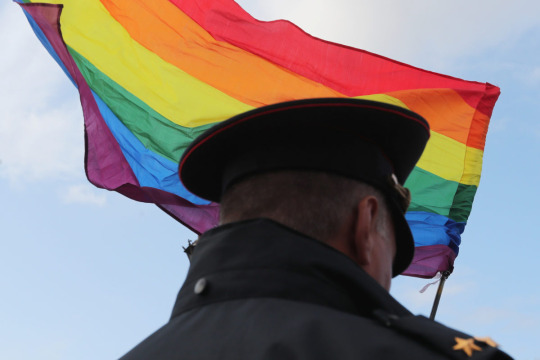
View On WordPress
#196 Immigration Act#Abu Bakr al-Baghdadi#Al-Qaeda#Ansar Allah Movement#Beat#Benjamin "Bibi" Netanyahu#Benny Gantz#Bibi#Boris Johnson#Covid hearings#Covid Inquiry#Dasha Litvinova#Dubai climate talks#eating disorders#Estonia#Gaza#Gaza Strip#Hamas#Hassan Nasrallah#Hizbullah#Houthis#ISIS#Jerusalem District Court#Joe Biden#Justice Ministry#Kay Burley#Kingdom of God#lesbian#LGBTQ#Ma&039;ariv
3 notes
·
View notes
Text
Now, the Mount Vernon Ladies' Association does occasionally sell items made from fallen historical trees, and there was in fact a white oak that George planted that fell. The real question is: is the knife actually made from that wood?
Wait no the silliest part of this story is:

What's the problem with that story?

al-Baghdadi didn't die from being shot.
Abu Bakr al-Baghdadi killed himself, and two children, with a suicide vest.
Trump should know that tidbit, because he announced it to the world:

The backdrop can't be made from the shirt of the dude who shot al-Baghdadi in the face because al-Baghdadi wasn't shot in the face. And now I doubt the provenance of the steel and the wood.
So, yeah, "forging" mystical artifacts for Trump.

they are now forging mystical artifacts for trump
1K notes
·
View notes
Text
Nael Al-Baghdadi held his 12-year-old son, Omar, and held him tight. But it was already too late. Omar, who was playing outside near his home, had been killed Tuesday in the Gaza Strip by an Israeli airstrike. In the photo made by Associated Press photographer Abdel Kareem Hana after the strike, al-Baghdadi’s eyes are shut. He holds his son, whose small body rests limply in his arms. His right hand and right shirt sleeve are streaked with blood. Grief is etched upon the father’s face, but more than that there is an expression of deep love for the child he has just lost. So much love that he insisted on holding Omar, uninterrupted, until the child could be shepherded hours later to his grave. Omar and his three friends were playing soccer in the street near their house in the Bureij refugee camp around noon Tuesday, under a blistering sun, when the Israeli airstrike hit and sent the street into a swirl of dust, blood and chaos. Al-Baghdadi was already in nearby Al-Aqsa Martyrs Hospital in Deir al-Balah with his injured brother. His cousin ran toward the wreckage, found Omar and took him to an ambulance. From there, he called the father and broke the news: His son had been killed; be ready to receive him. According to al-Baghdadi, he met the ambulance when it rolled into the hospital, picked up his son’s body and carried it to the morgue, weeping all the way. He refused to put his son on the ground inside the morgue, holding him gently until he was shrouded and the funeral prayer was performed before a quick burial.
1 note
·
View note
Text
Istri Al Baghdadi Dijatuhi Hukuman Mati
BAGHDAD (Arrahmah.id) — Pengadilan Irak telah menjatuhkan hukuman mati terhadap istri mendiang pemimpin kelompok militan Islamic State (ISIS), Abu Bakr al-Baghdadi, karena turut bekerja sama dengan kelompok militan tersebut dan menahan perempuan Yazidi di rumahnya. Pejabat di pengadilan mengatakan bahwa istri Baghdadi, yang tidak disebutkan namanya, telah dibawa kembali ke Irak setelah sempat…
0 notes
Text

1 note
·
View note
Text
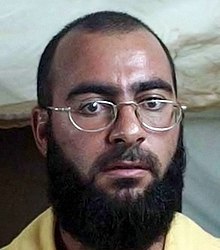




Abu Bakr al-Baghdadi (2014-2019)
Abu Ibrahim al-Hashimi al-Qurashi (2019-2022)
Abu al-Hasan al-Hashimi al-Qurashi (Feb'22-Oct'22)
Abu al-Hussein al-Husseini al-Qurashi (2022-2023)
Abu Hafs al-Hashimi al-Qurashi (since 2023)
#Abu Bakr al-Baghdadi#Abu Ibrahim al-Hashimi al-Qurashi#Abu al-Hasan al-Hashimi al-Qurashi#Abu al-Hussein al-Husseini al-Qurashi#Abu Hafs al-Hashimi al-Qurashi#IS#ISIS#ISIL#Daesh
0 notes
Text
Melania Trump has opened up a 'hero dog' story after the death of the ISIS kingpin: book
Then-First Lady Melania Trump observed the 2019 raid that led to the death of ISIS leader Abu Bakr al-Baghdadi in the White House Situation Room and suggested that her husband’s administration investigate the story of the “hero dog,” the participated, should promote to a new book. Melania Trump observed the operation along with then-President Donald Trump, Vice President Mike Pence, Secretary of…
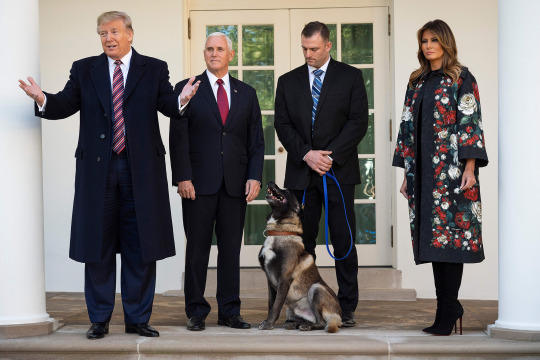
View On WordPress
0 notes
Text
Made moist with love’s dew, Adam’s soil became clay.
— MAJD AL-DIN BAGHDADI ⚜️ Love’s Alchemy: Poems from the Sufi Tradition, transl. by David Fideler & Sabrineh Fideler, (2010)
#Persian#مجد الدين البغدادي#Majd al-Din Baghdadi#Love’s Alchemy: Poems from the Sufi Tradition#David Fideler#Sabrineh Fideler#(2010)#Adam
14 notes
·
View notes
Text
"EUROPEANS ATE GROUND-UP EGYPTIAN MUMMIES!!!! ALL THE TIME!!!"
sounds much more dramatic than
"Europeans sometimes consumed ground-up Egyptian mummies, or fluid found inside the chest cavities of mummies, or a type of tree resin that became associated with mummies because it kind of looked like the bitumen used in the embalming process, or the dried and ground flesh of very specific European dead- most likely a bit of all of the above at various times in various places. but it's hard to say what the proportion of each was- and at least one early Middle Eastern physician, Abd al-Latif al-Baghdadi from modern-day Iran, also advised the use of the Body Cavity Liquid variety hundreds of years before the first documented use of mummy by Europeans. so it was a medicinal thing in the areas from whence the mummies came, too. unsurprising seeing as a lot of cultures- including Europeans -have done Corpse Medicine with their own people for centuries. there was also been pushback against the medicinal use of mummies in Europe since at least the 16th century; it remains unclear how popular the notion was at any given time. so the answer to Is This A Good Symbol For The Effects of European Colonialism In Egypt remains a resounding 'ehhh...?'"
"because the whole idea is, is it not, that Europeans were literally consuming the dead bodies of a non-European people who would have had no reason to sell their dead without a European market. and that's kind of true! there was a market that created a demand! but they were also already putting the bodies to these uses closer to home before Europeans started, because this whole thing began with both Arab and European doctors misinterpreting other Arab doctors who were talking about the medicinal qualities of tree resin. so really it's not as simple a situation as we might like to believe."
"and Mummy Brown paint is like this whole other situation where it was supposed to be made from ground-up mummies but often wasn't because Cost-Cutting, and a lot of artists didn't really like it anyway, and others used it thinking the name only referred to the color, and one time Edward Burne-Jones attempted an Egyptian funeral for a tube of Mummy Brown paint because he was so horrified with the origins, so while that's a more straightforward as an Oh Shit Violent Colonialism situation, people merrily waltzing into shops and buying one tube of Dead Egyptian Person, please, my good man! wasn't quite as widespread as one might now think"
"for me, the more compelling image of Europe Fucking Egypt Over is that of a white archaeologist peering curiously into a pit where Egyptian people are working tirelessly to excavate a tomb, their names to be lost to history in favor of whatever rich white person they toiled for. even that image is not without complicating factors- I, imagining it, am a white woman who cannot ask those Egyptian men what they think and feel about all their role in all this -but to me it seems more reliable than the VERY complex and often misinterpreted history of the mummy trade, even as I understand it after like an hour of research"
"on the OTHER HAND, does it even matter if people in the Middle East were already doing mummy medicine, when Europeans increased demand? does it even matter if Europeans felt bad or at least grossed out about Mummy Brown paint or if it wasn't ~always~ real mummies? maybe it doesn't! maybe my instincts as a history worker to say It's More Complicated are clouding my judgment on the nature of colonialism! or maybe they aren't! or maybe different people will think I'm right or think I'm full of shit and that's just the nature of doing public history on The Tungles!"
"anyway I have COVID and should probably go to bed now"
"this article and the Wiki page for Mummia are very well-sourced"
938 notes
·
View notes
Text
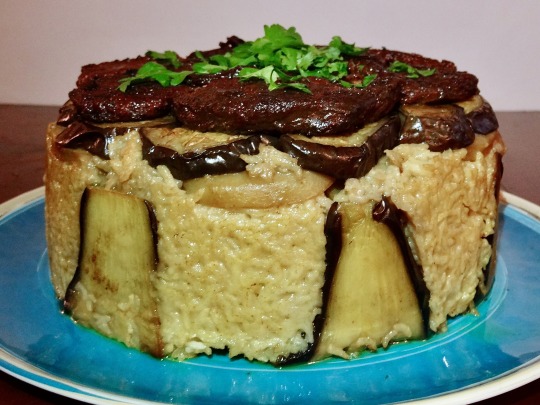
[ID: A wide cylindrical pile of rice, eggplants, and 'lamb' on a serving platter, garnished with parsley. End ID]
مقلوبة / Maqluba
مَقْلُوبَة ("maqlūba," "upside down" or "turned over") is a Levantine casserole in which spiced meat, fried vegetables, and rice are arranged in a pot and simmered; the entire pot is then inverted onto a serving tray to reveal the layered ingredients. Maqluba historically uses lamb and eggplant, but modern recipes more often call for chicken; tomato, cauliflower, potato, bell pepper, and peas are other relatively recent additions to the repertoire.
A well-made maqluba should be aromatic and highly spiced; the meat and vegetables should be very tender; and the rice should be cohesive without being mushy. A side of yoghurt gives a tangy, creamy lift that cuts through and complements the spice and fat in the dish.
Maqluba emphasizes communal eating and presentation. It is usually eaten during gatherings and special occasions, especially during Ramadan—a month of sunrise-to-sunset fasting which celebrates the revelation of the Qu'ran to the prophet Mohammad. The pot is sometimes flipped over at the table for a dramatic reveal.
History
Many sources cite Muhammad bin Hasan al-Baghdadi's 1226 Kitāb al-ṭabīkh (كتاب الطبيخ لمحمد بن حسن البغدادي) as containing the first known reference to maqluba. However, the recipes for "maqluba" in this book are actually for small, pan-fried patties of spiced ground meat. [1] The dish is presumably titled "maqluba" because, once one side is fried, the cook is instructed to turn the patties over ("أقلب الوجه الآخر") to brown the other; the identical name to the modern dish is thus coincidental.
References to dishes more like modern maqluba occur elsewhere. A type of مغمومة ("maghmūma," "covered" dish), consisting of layers of meat, eggplant, and rice, covered with flatbread, cooked and then inverted onto a serving plate, is described in a 9th-century poem by إبراهيم بن المهدي (Ibrāhīm ibn al-Mahdī):
A layer of meat underneath of which lies a layer of its own fat, and another of sweet onion, another of rice, Another of peeled eggplant slices, each looking like a good dirham honestly earned. [...] Thus layered the pot is brought to a boil first then enclosed with a disc of oven bread. On the glowing fire it is then put, thus giving it what it needs of heat and fat. When fully cooked and its fat is well up, turn it over onto a platter, big and wide. (trans. Nawal Nasrallah) [2]
These sources are both Iraqi, but one story holds that maqluba originated in Jerusalem. صلاح الدين الأيوبي (Ṣalāḥ ad-Dīn al-Ayyūbi; "Saladin"), after capturing the city from the Crusaders and reinstating Muslim rule in 1187, was served the dish, and was the first to describe it with its current name. Before this point, the Jerusalem specialty had supposedly been known as "باذنجانية" ("bāḏinjānīyya"), from "باذنجان" "bāḏinjān" "eggplant" + ية- "-iyya," a noun-forming suffix.
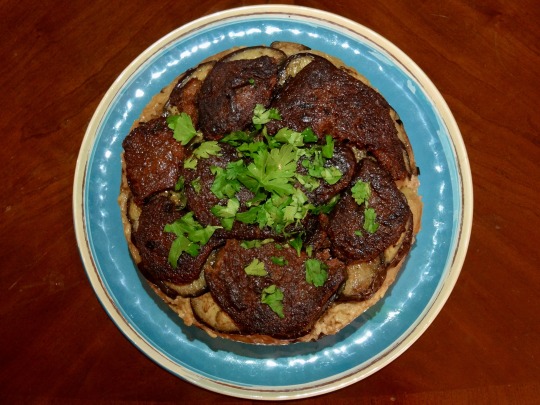
[ID: The same dish shown from directly above. End ID]
In Palestine
Maqluba is often invoked in the context of Palestinian strength and resistance, in defiance of its occasional description as an "Israeli" dish. Palestinian magazine writer Aleeya Rizvi reflects:
In the wake of the recent [2023] war in Gaza, our culinary endeavors, particularly in crafting and sharing traditional Palestinian dishes like Maqluba, represent a conscious effort to contribute to the preservation and resilience of Palestinian culture. In a time when cultural heritage is under threat, preparing and enjoying these time-honored recipes becomes more than a mere culinary activity; it transforms into a deliberate act of cultural continuity and solidarity.
Maqluba also has a more specific association with physical resistance against the backdrop of increased settler and police violence against Palestinians, including regular Israeli raids and attacks on the جامع الأقصى ("Jāmi' al-Aqṣā"; al-Aqsa mosque), during Ramadan.
The holiest month in the Islamic calendar, Ramadan is given over to fasting, prayer, and reflection; people gather together in homes and mosques to break their fast after sunset, and spend entire nights in mosques in worship. Khadija Khwais and Hanady Al-Halawani used to serve maqluba for افطار ("ifṭār," fast-breaking meal) in the Al-Aqsa mosque, until Israeli occupation authorities banned them from the mosque for "incitement."
In response, starting in 2015, Al-Halawani and other volunteer مرابطين ("murābiṭīn," lit. "holy people," guardians of the mosque) stationed themselves on the ground outside the mosque's gate (باب السلسلة; Bāb as-Silsila, "chain gate") to prepare and serve maqluba. Those who were banned from entering the mosque broke their fast and prayed at the mosque's gates, and in the nearby alleys of the Old City. The same year saw Israeli security personnel and settlers attack Palestinian protestors and guardians outside and inside the mosque with tear gas and stun grenades.
For Al-Halawani, the serving of maqluba at the al-Aqsa gates symbolizes "defiance, steadfastness, and insistence on continuing the fast [...] in spite of the occupation’s practices." The "Maqluba at al-Aqsa" ritual "has become one of the most disturbing Palestinian scenes for the occupation forces," who associate it with the defense of "Palestinian heritage" and the intent to "motivate worshipers and murabitin to repel incursions into the mosque." (Al-Halawani has been arrested, threatened, beaten, and detained by Israeli police multiple times for her role as a defender of Al-Aqsa. She was among the prisoners freed in trades between Israel and Hamas in December 2023.)
In 2017, occupation forces installed metal detectors, electronic gates, metal barriers, and police cameras to surveil worshipers following a shoot-out at one of al Aqsa's gates. Hundreds of protesters refused to enter the mosque until the repressive measures were removed, instead gathering and praying in its courtyard; surrounding families bolstered the sit-ins by serving food and drink. When the gates were dismantled, over 50,000 people gathered to eat maqluba in celebration, picking up on the earlier association of the dish with Saladin's victory (and its resultant alternate name, "أكلة النصر," "ʔakla an-naṣr," "victory meal").
The name "maqluba," meaning "upside-down" or "inverted," may be associated with victory and resistance as well. Fatema Khader noted in 2023 that the method of serving maqluba was a "symbolic representation of how Israeli policies and decisions against Palestinians will be flipped on their heads and become rendered meaningless." It is also relevant that maqluba is meant to be served to large groups of people, and can thus be linked, symbolically and literally, to solidarity and communal resistance.
This year in Gaza, Palestinians show steadfast optimism as they paint murals, hang lanterns, buy sweets, hold parties, and pray in groups amongst the rubble where mosques once stood. But despite these efforts at creating joy, the dire circumstances take heavy tolls, and the holiday cannot be celebrated as usual: Israel's campaign of slow starvation led Ghazzawi Diab al-Zaza to comment, "We have been fasting almost against our will for three months".
Donate to provide hot meals in Gaza for Ramadan
[1] Also reprinted in Mosul: Umm Al-Rubi'in Press (مطبعة ام الربيعين) (1934), p. 57. For an English translation see Charles Perry, A Baghdad Cookery Book (2005), pp. 77-8.
[2] This poem, as well as one of Ibn al-Mahdi's maghmuma dishes, were compiled in Ibn Sayyar al-Warraq's 10th-century Book of Dishes (كتاب الطبيخ وإصلاح الأغذية المأكولات وطيّبات الأطعمة المصنو; "Kitāb al-ṭabīkh waʔiṣlāḥ al-ʔaghdiyat al-maʔkūlāt waṭayyibāt ʔaṭ'ima al-maṣno," "Book of cookery, food reform, delicacies, and prepared foods"), p. 99 recto. For Nasrallah's English translation see Annals of the Caliph's Kitchens, pp. 313-4.
In the 14th-century Andalusian Cookbook (كتاب الطبيخ في المغرب والأندلس في عصر الموحدين، للمكلف المجهول; "Kitāb al-ṭabīkh fī al-Maghrib wa al-Andalus fī ʻaṣr al-Mawahḥidīn," "Book of cookery from the Maghreb and Andalusia in the era of Almohads"), a maghmuma recipe appears as "لون مغموم لابن المهدى", "maghmum by Ibn al-Mahdi". For an English translation see An Anonymous Andalusian Cookbook, trans. Perry et al.
Ingredients:
For a 6-qt stockpot. Serves 12.
For the meat:
1 recipe seitan lamb
or
2 cups (330g) ground beef substitute
1 cinnamon stick
1 bay laurel leaf
Pinch ground cardamom
Several cracks black pepper
For the dish:
3 cups (600g) Egyptian rice
2 medium-sized globe eggplants
2 large Yukon gold potatoes (optional)
Vegetarian 'chicken' or 'beef' bouillon cube (optional)
2 1/2 tsp table salt (1 1/2 tsp, if using bouillon)
Vegetable oil, to deep-fry
Fried pine nuts or sliced blanched almonds, to top
Egyptian rice is the traditional choice in this dish, but many modern recipes use basmati.
I kept my ingredients list fairly simple, but you can also consider adding cauliflower, carrots, peas, chickpeas, zucchini, bell pepper, and/or tomato to preference (especially if omitting meat substitutes).
For the spices:
1 1/2 Tbsp maqluba spices
or
1 4" piece (3g) cinnamon bark, toasted and ground (1 1/2 tsp ground cinnamon)
3/4 tsp (2.2g) ground turmeric
3/4 tsp (1.5g) cloves, toasted and ground
3/4 tsp (2.2g) black peppercorns, toasted and ground
15 green cardamom pods (4.5g), toasted, seeds removed, and ground (or 3/4 tsp ground cardamom)
Instructions:
For the meat:
1. Prepare the seitan lamb, if using: it will need to be started several hours early, or the night before.
2. If using ground meat: heat 2 tsp oil in a skillet on medium. Add cinnamon stick and bay leaf and fry for 30 seconds until fragrant.
3. Add meat and ground spices and fry, agitating occasionally, until browned. Set aside.
For the dish:
2. Rinse rice 2 to 3 times, until water runs almost clear. Soak in cold water for 30 minutes, while you prepare the vegetables.
3. Optional: to achieve a presentation with eggplant on the sides of the maqluba, remove the skin from either side of one eggplant (so that all slices have flesh exposed on both sides) and then cut lengthwise into 1/2" (1cm)-thick slices.
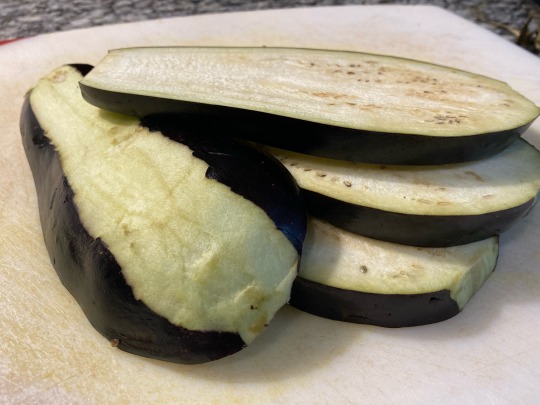
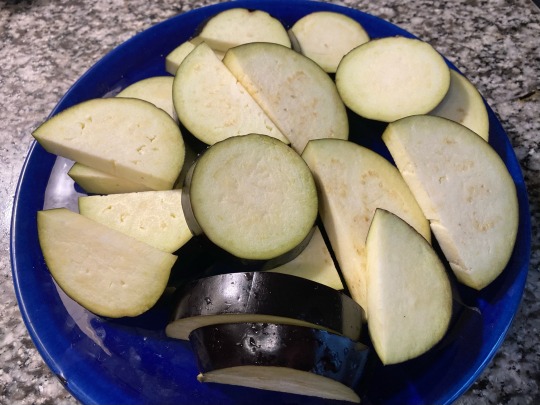
Cut the other eggplant (or both eggplants) widthwise into coins and half-coins.
4. Sprinkle eggplant slices with salt on both sides and leave for 10-15 minutes to release water.
5. Peel potatoes and cut in 1/4" (1/2 cm) slices.
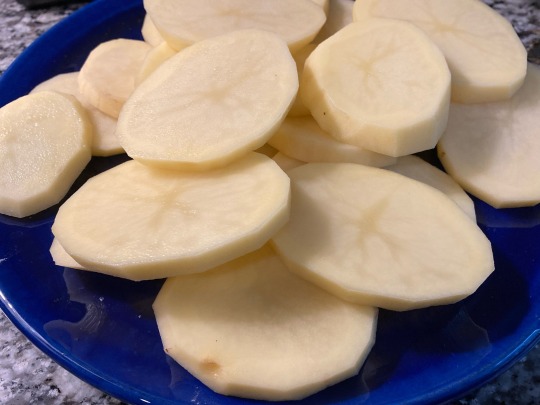
6. Heat about an inch of oil in a deep skillet or wok on medium (a potato slice dropped in should immediately form bubbles). Fry the potato slices until golden brown, then remove onto a paper-towel-lined plate or wire cooling rack.
7. Press eggplant slices on both sides with a towel to remove moisture. Fry in the same oil until translucent and golden brown, then remove as before.
Fry other vegetables (except for tomato, chickpeas, and peas) the same way, if using.
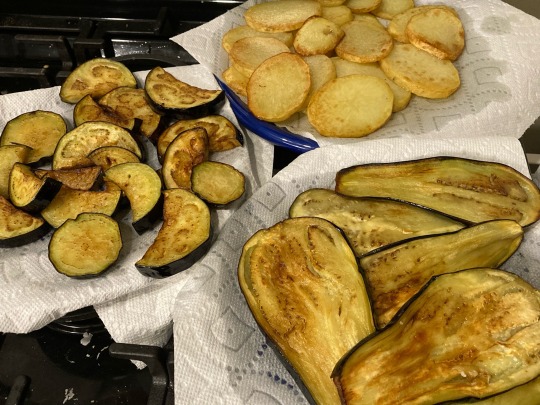
8. Drain rice. Whisk bouillon, salt, and ground spices into several cups of hot water.
9. Prepare a large, thick-bottomed pot with a circle of oiled parchment paper (or with a layer of sliced tomatoes). Add ground meat, if using. Layer widthwise-sliced eggplants into the pot, followed by potatoes. Place longitudinally sliced eggplants around the sides of the pot, large side up.
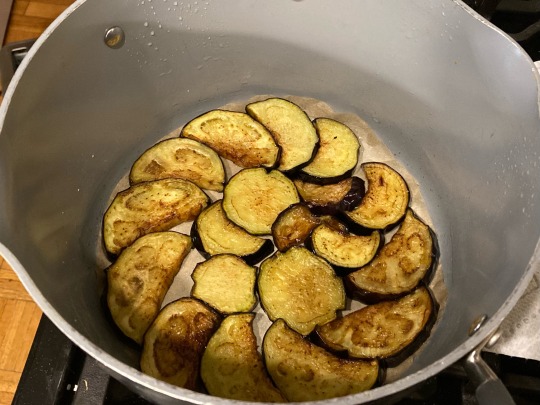
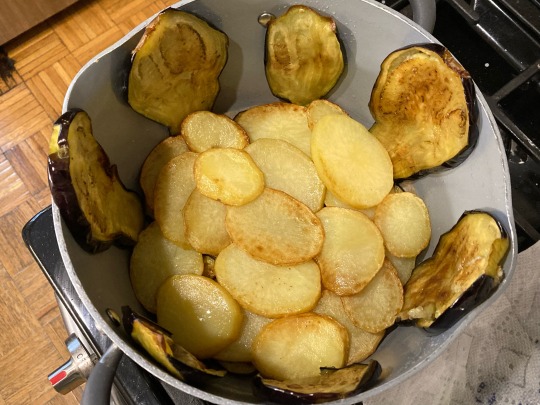
10. Add rice and pack in. Fold eggplant slices down over the rice, if they protrude.
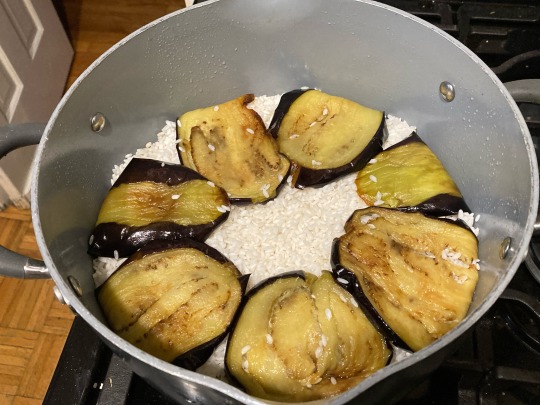
11. Pour broth into the pot, being careful not to upset the rice. Add more water if necessary, so that the rice is covered by about an inch.
12. Heat on medium to bring to a boil. Reduce heat to low, cover with a closely fitting lid, and cook 30 minutes.
13. If rice is not fully cooked after 30 minutes, lightly stir and add another cup of water. Re-cover and cook another 15 minutes. Check again and repeat as necessary.
14. Allow maqluba to rest for half an hour before flipping for best results. Place a large platter upside-down over the mouth of the pot, then flip both over in one smooth motion. Tap the bottom of the pot to release, and leave for a few minutes to allow the maqluba to drop.
15. Slowly lift the pot straight up, rotating slightly if the sides seem stuck.
16. Top with fried seitan lamb, chopped parsley, and fried pine nuts or almonds, as desired.
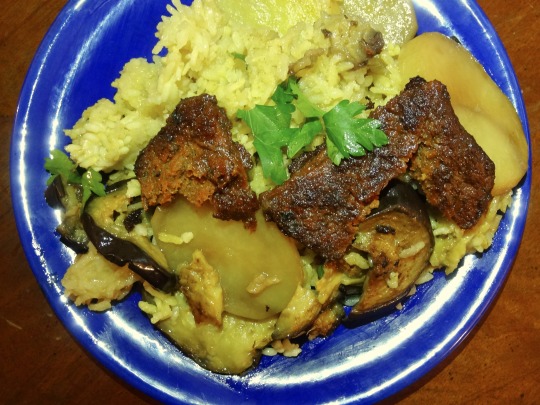
368 notes
·
View notes
Note
How come so many shias support hezbollah even though it has syrian blood on its hands? Im shia and i never got it. Like i saw a post from a bosnian (who talks a lot about genocide in general and palestine) a while ago saying that its ok to have different feelings over naserallah's death because of different things (i.e. hezbollah helped bosnia during the genocide they were going through, but it also has syrian blood on its hands from interviewing with the revolution). Same thing for the houthis, ive heard for years from feminist spaces over people going in prison in yemen because of the houthis, and its not even anything serious. Is the end goal supporting palestine, and maybe after isreal's death, we start dissecting our own politics and groups in the region?
If Hezbollah wasn't in Syria, then Syria would've been overrun by ISIS and there would have been a genocide of religious and ethnical minorities, this is a fact that can not be denied. After all, don't ever forget what happened in Speicher. The opposition were more than willing to defect over ISIS as they were claiming land, given the overlapping ideology between the various Salafist elements, it was easier for them to adapt to the ideology of ISIS. The only difference between HTS and ISIS were its goals, they otherwise held the same belief. Why do you think Al-Baghdadi (la) and Al-Jolani (la) were negotiating between each other throughout the war? These people were in cahoots with each other, but westerners and libs fully embraced this tyrant just like they did with Osama, because the Syrians are free, I mean, maybe for the Sunnis in Syria, bnut not the rest. The Shi'a Muslims had every right to defend the Lebanese-Syria border and eliminate a threat to religious minorities. Furthermore, had the Axis not intervened, the war would ultimately give leeway for the revisionists Zionists and its imperialist benefector to secure more land and eliminate the Axis.
Materialistically, whether Hezbollah had blood in its hand or not, critical support is always important regardless of what you think. Assad was by no means good, even S Nasrallah (r.a) said that he acknowledged the war crimes that Assad committed, but that the alternative was no better, hence why Hezbollah had to secure the Lebanese border and intervene within Syria to prevent a spillover of Salafist Jihadist into various parts of Southwest Asia.
But now that Assad is gone, we are seeing the persecution of religious minorities, the elimination of secular institutions, the Settler state destroying and taking more of Syria, barbarians and executioners being appointed as ministers and Turkey using the opportunity to send its cannonfodder to attack the Kurds. It's only a matter of time until the consititution is completely rewritten and you'll have yourself a Sunni theocracy. The Syrian people did not win this war, the Turks, the Israelis, the US and the rest of NATO did.
130 notes
·
View notes
Text
The Abu Saqer family is trying to evacuate Gaza for Egypt. They hope to find safety and to rebuild their lives and pursue their dreams. They write,
everyone in our family has a dream to fulfill, and has something he/she is passionate about:
Mohsen Abu Saqer, a 50-year-old father who suffers from a number of chronic diseases, wants to see his family members achieving their dreams peacefully, also, he wants to live in peace, as he has seen it all, the two intifadas, the Gulf wars, Gaza wars, etc...
Safinaz Al-Baghdadi, a 50-year-old mother, has the same dreams as our father, she is a UN employee, throughout 25 years, she has taught many students, she left her impact on a lot of them, as most of them are still in contact with her.
Yahia Abu Saqer, the older son, and a teaching assistant at the Islamic University of Gaza, and a student who is trying to obtain a master's degree in Data Science, unfortunately, the Islamic University of Gaza has been bombed and severely damaged, and his dream to become a data scientist has faded away.
Hala Abu Saqer, a 22-year-old Biotech specialist, her dream was to complete her studies abroad, but the ongoing war has made this impossible for her.
Ibrahim Abu Saqer, a 21-year-old college student, dreams of becoming a dentist, after 4 years of hard work, and high expenses, the war has made all of that go in vain, he is so depressed because of his lost effort.
Haia Abu Saqer, an 18-year-old high school graduate, won a scholarship in Turkey, as she dreams of becoming a psychiatrist, to cure the damaged souls of Gazans because of all of those wars and the 17 years of blockade, but with this war starting out of nowhere, she can't go out to Turkey.
Deema Abu Saqer, a 17-year-old high school student, her dreams are simple and innocent, as she wants to get a high average in her final year of high school, so she can celebrate her success with her family and relatives.
If you can spare any funds, please consider sharing them with this family. The cost for evacuating 7 people to Egypt is very high, but they are making good progress. They are hoping to reach $35,000 by Eid, which will begin this year on Wednesday April 11th. Let’s help them reach their goal!
Thank you all❤️
#gaza#gaza genocide#gaza strip#gaza under attack#free gaza#from the river to the sea palestine will be free#palestinian genocide#link#abu saqer family#aid for palestine#aid for gaza#mutual aid#gazan genocide#stop gaza genocide#stop genocide#stop the genocide
378 notes
·
View notes
Note
Verified petition by the olive branch: https://www.gofundme.com/f/help-to-evacuate-gaza
£15,847/£30,000
over halfway to their goal!
285 notes
·
View notes